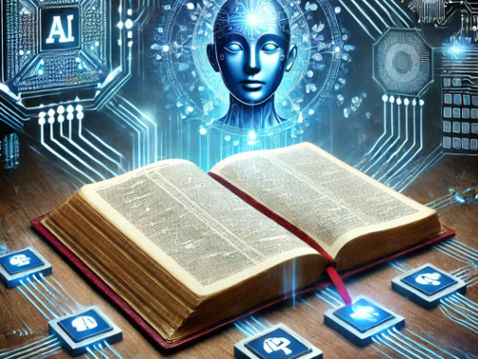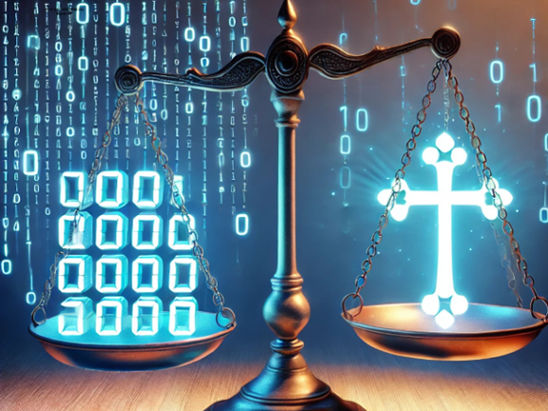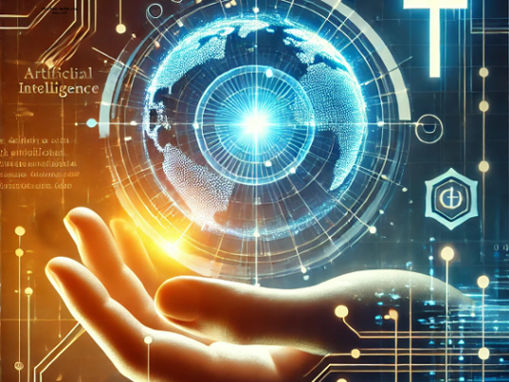Artificial Intelligence (AI) is changing how we work, live, and interact with the outside world. Its impact is profound and growing, from healthcare to education. As Christians, an important question arises: what does the bible say about ai? Does the Bible offer guidance on how to engage with this powerful technology?
This discussion is crucial because AI’s influence touches our lives’ ethical, social, and spiritual dimensions. It challenges us to think deeply about how faith intersects with innovation. By examining key biblical principles, we can gain insight into approaching AI responsibly and faithfully.
2. The Role of Human Creativity in AI Development
According to the Bible, people were made in the image of God: “So God created mankind in his own image, in the image of God he created them; male and female he created them” (Genesis 1:27). This profound truth reflects the divine gift of creativity and innovation bestowed upon humans. AI development is an extension of this creativity, showcasing humanity’s ability to solve problems and imagine new possibilities.
Yet it’s equally essential to see its limitations. Unlike humans, it does not possess soul feelings or moral thinking. It can mimic intelligence but cannot grasp what it is to be human—a reminder of God’s special design for creation.
This difference makes it evident that although AI is a product of human creativity, similar to human wisdom, it cannot be a substitute for God’s divine wisdom or power. Therefore, Christians should consider AI as a tool and the ultimate solution to use it in ways that glorify God.
3. Biblical Themes Relevant to AI

Stewardship
Genesis 2:15 instructs humanity to care for creation: “The Lord God took the man and put him in the Garden of Eden to work it and take care of it.” This call to stewardship applies to AI as well. Christians must ensure that AI is used responsibly, benefiting humanity and avoiding harm or exploitation.
Wisdom
Proverbs 3:5-6 reminds believers to “Trust in the Lord with all your heart and lean not on your understanding; in all your ways submit to him, and he will make your paths straight.” This emphasizes the need for discernment when developing and applying AI. Relying on God’s guidance helps Christians navigate the ethical complexities surrounding technology.
Accountability
Ezekiel 18:20 highlights personal responsibility: “The one who sins is the one who will die.” Similarly, humans remain accountable for the actions and consequences of AI. While AI itself is neutral, the intentions behind its use—and the outcomes it produces—are a reflection of human moral choices.
Justice and Mercy
Micah 6:8 calls Christians to act justly, love mercy, and walk humbly with God: “He has shown you, O mortal, what is good. And what does the Lord require of you? To act justly and to love mercy and to walk humbly with your God.” This principle can guide how AI is used—promoting fairness, compassion, and equity rather than perpetuating injustice or inequality.
4. Potential Benefits of AI for Christians

Spreading the Gospel
AI gives great opportunities for service toward the mission of the church. For instance, AI tools can speed up the Bible translation, thus making God’s Word available to languages and people who have not heard it before. Online platforms and chatbots, based on AI, can provide assistance in spreading sermons and responding to spiritual questions, thus spreading the Gospel.
Serving Communities
AI can help solve social problems. In healthcare, AI tools can make diagnosing and planning treatments better for patients. In disaster relief, AI can predict and lessen the effects of crises. AI education tools can create better learning chances, especially for communities that need it the most. These uses show God’s love by helping people with their needs.
Facilitating Worship
AI tools can be useful in planning and improving worship experiences. For example, AI software can aid pastors in planning sermons, scripture studies, and special discipleship resources. AI can assist worship leaders in composing music or producing multimedia presentations that make their services more engaging and meaningful.
5. Ethical Challenges of AI
Bias in AI Systems
AI systems, if not built ethically, can continue bias and inequality. For instance, biased training data can cause unfair treatment of some groups. Christians should support fairness and inclusivity in AI design, making sure it follows biblical values of justice and equality.
Privacy Concerns
Large volumes of personal data are frequently used by AI, which raises privacy problems. Protecting individual rights is consistent with Christian principles. Respecting privacy reflects the biblical call to love our neighbors and uphold their dignity (Mark 12:31).
Dependence on Technology
There is a risk of becoming overly reliant on AI, potentially leading to idolatry—placing trust in technology instead of God. Christians are reminded in Psalm 20:7: “Some trust in chariots and some in horses, but we trust in the name of the Lord our God.” AI should be used as a tool, not a substitute for faith or divine reliance.
6. AI in Prophecy and Eschatology

AI and End-Times Prophecy
Speculation about the role of AI in end-time prophecy has been growing. For instance, Revelation 13:16-17 speaks about the “mark of the beast” that will allow commerce, and some interpret it as a technological system. Though interesting, these interpretations should be approached with much caution and must be grounded in sound biblical theology.
Balancing Speculation with Discernment
It is a matter of balancing the interest of AI in prophecy with biblical discernment. Rather than being too interested in speculations, it would be best to live faithfully and spread the gospel.
7. Theological Questions About AI
Can AI Achieve Consciousness?
A theological question in this regard would be whether AI could become conscious. From the biblical perspective, consciousness and soul are unique features of human beings, created in God’s image. AI is a man-made tool and thus lacks the spiritual essence that characterizes humanity.
AI Surpassing Human Capabilities
As AI becomes better than humans in some areas, Christians might think about what this means. Instead of being scared, believers can see this as a chance to make sure technology serves people and doesn’t control them. God’s power over creation stays the same, no matter how technology advances.
8. Real-World Examples of AI in Action
Positive Uses of AI
- AI has been used to save lives, such as in medical imaging and predictive healthcare tools.
- Christian organizations have employed AI to translate the Bible and distribute it to remote regions, demonstrating its potential for good.
Harmful Applications of AI
- Surveillance abuse and unethical AI applications highlight the need for responsible oversight. Christians should advocate for justice and accountability in these areas.
Ethical AI Initiatives
- Many Christian organizations are working to ensure AI aligns with biblical principles. These initiatives showcase how technology can reflect God’s love and justice in practical ways.
9. Practical Guidance for Christians
Educating Oneself on AI
Christians are encouraged to learn about AI and its implications. Understanding how AI works and its potential impact helps believers make informed decisions about its use in personal and professional contexts.
Advocating for Fairness and Justice
Believers should actively promote ethical AI policies that uphold justice and equality. Engaging in discussions, participating in community initiatives, and supporting organizations that align with biblical values can make a difference.
Using AI Responsibly
AI tools should be used thoughtfully and with discernment. Whether in workplaces, churches, or homes, Christians should ensure AI applications serve meaningful purposes and do not compromise spiritual or ethical principles.
10. The Importance of Faith Over Fear
While AI can evoke concerns about rapid technological change, Christians are reassured that God remains sovereign over all creation. Isaiah 41:10 reminds us: “So do not fear, for I am with you; do not be dismayed, for I am your God. I will strengthen you and help you; I will uphold you with my righteous right hand.”
Instead of fearing AI, believers can trust in God’s plan and use AI as a tool to glorify Him. Maintaining faith amidst uncertainty is a testament to God’s unchanging nature and divine purpose.
11. Conclusion
Artificial Intelligence is a powerful tool that demonstrates human creativity and ingenuity. As Christians, we should use AI wisely, responsibly, and with a focus on biblical values. We can use AI to help people and honor God by taking care of our actions, asking for God’s guidance, and focusing on justice and kindness.
The question is not whether AI is good or bad but how we, as followers of Christ, choose to use it. With much thought about it, we can ensure that AI helps in doing good in the world, in line with God’s purposes.
